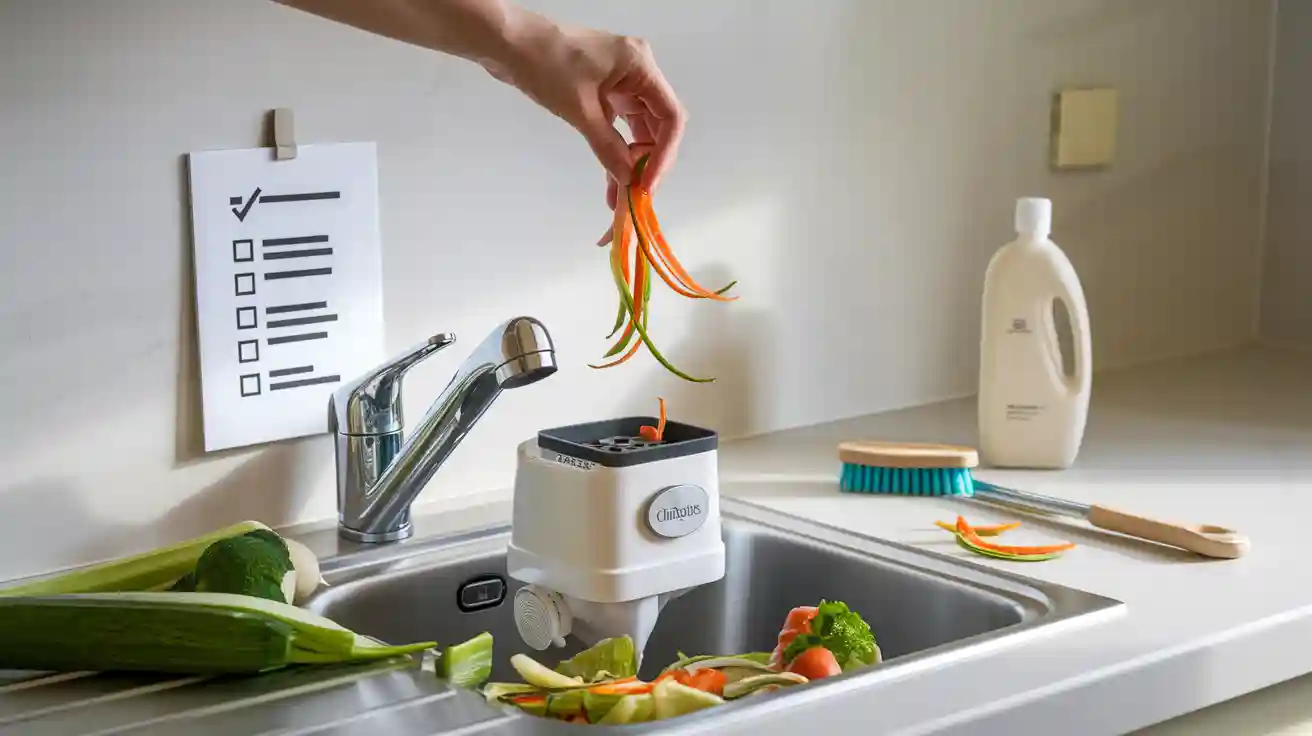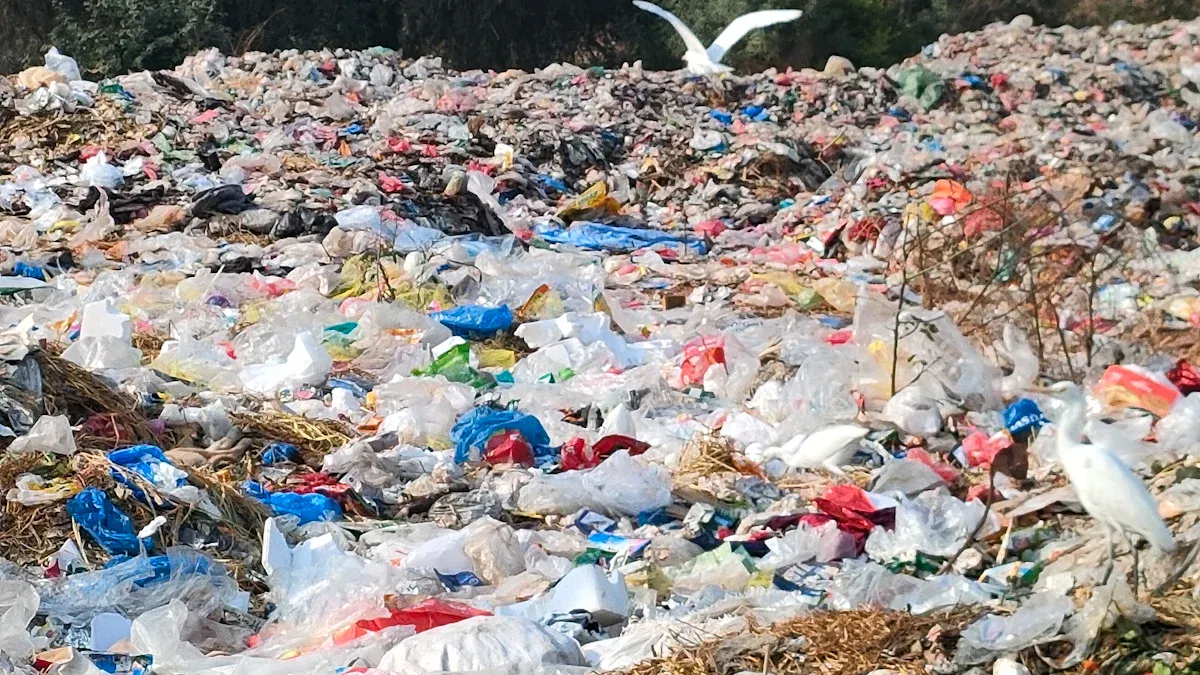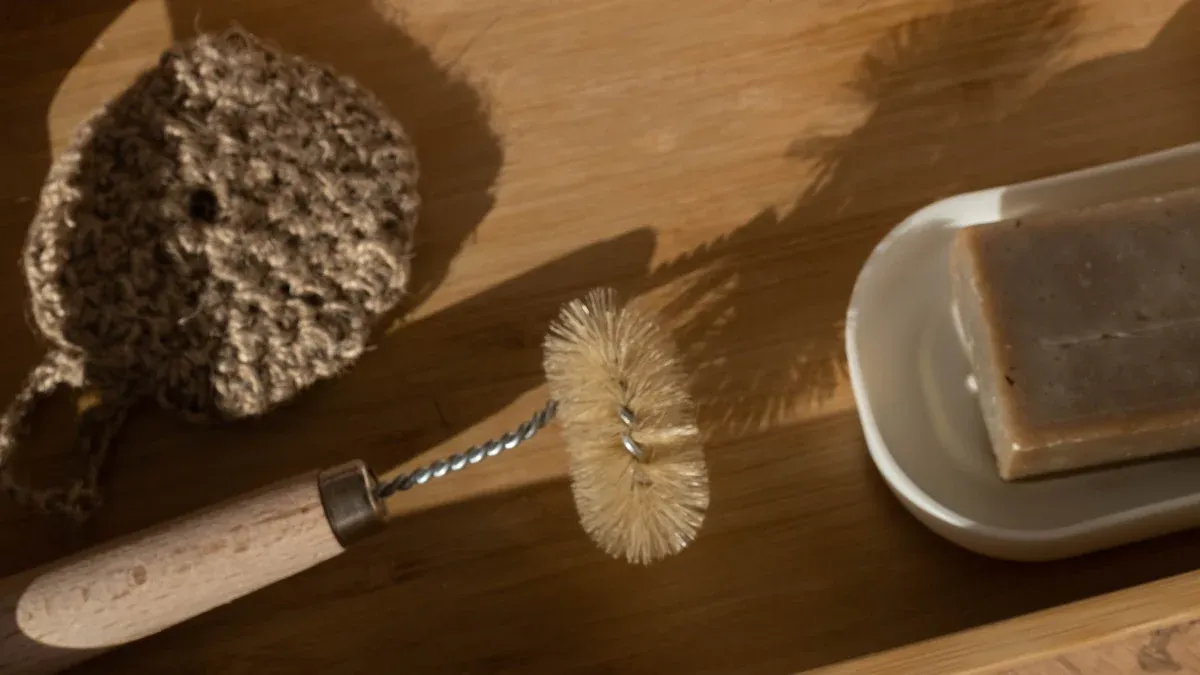
Over half of U.S. homes with full kitchens now use a food disposal tool, showing their popularity. You can keep your food disposal tool running smoothly with just a few simple habits. Consistent care helps prevent breakdowns and supports optimal performance for a longer-lasting kitchen helper.
Daily and Weekly Food Disposal Tool Tips
Run Cold Water Every Time You Use the Garbage Disposal
Running cold water is one of the most important tips for keeping your garbage disposal in top shape. Cold water helps fats and grease stay solid, so the disposal can grind them up and flush them away. If you use hot water, grease can melt and later harden inside your pipes, causing clogs. Always turn on a medium stream of cold water before you start the garbage disposal. Keep the water running while the disposal works, and let it flow for at least 15 to 60 seconds after you turn off the machine. This extra time helps wash away any leftover food particles.
Tip: Cold water also helps prevent the motor from overheating and keeps the food disposal tool working smoothly.
Use Your Food Disposal Tool Regularly
You should use your garbage disposal often, even if you do not have much food waste. Frequent use keeps all the parts moving and stops rust and corrosion from building up. When you run the disposal, you help prevent debris from sticking to the blades and inside walls. If you let the disposal sit unused, food particles and moisture can cause bad smells and even damage the machine.
- Run the garbage disposal at least once a week.
- Feed scraps in small amounts and avoid overloading.
- If you do not have food waste, run the disposal with cold water for a few seconds to keep it fresh.
Regular use is a simple way to extend the life of your food disposal tool and avoid costly repairs.
Clean with Ice Cubes and Citrus Peels
Cleaning your garbage disposal does not have to be hard. You can use ice cubes and citrus peels for light, weekly cleaning. Ice cubes help knock loose small bits of debris and can even help chop up your waste more effectively. Citrus peels, like lemon or orange, release natural oils and citric acid. These ingredients help fight odors and leave your kitchen smelling fresh.
Here is a quick cleaning method you can try:
- Drop a handful of ice cubes into the garbage disposal.
- Add a few citrus peels on top.
- Turn on the cold water and run the disposal for about 30 seconds.
Note: This method works best for light cleaning and odor control. For deep cleaning, you may need to use baking soda and vinegar or another safe cleaner.
By following these daily and weekly tips, you help your garbage disposal stay clean, fresh, and ready to handle your kitchen’s food waste.
Garbage Disposal Best Practices: What to Avoid

Foods That Cause Clogs and Jams
You can prevent clogged drains by knowing which foods to keep out of your garbage disposal. Many common foods cause jams or blockages. The table below shows which foods create the most problems and why:
| Food Item | Reason for Clogging or Jamming in Disposal Tools |
|---|---|
| Fibrous vegetables | Wrap around blades, damage motor (e.g., celery, corn husks, carrots, onion skins, potato peels, asparagus, artichokes) |
| Meat bones | Jam blades, hurt motor |
| Large chunks of meat | Jam blades, clog drain |
| Rice and pasta | Expand with water, create thick pastes causing clogs |
| Banana peels | Wrap around blades, slow decomposition causing jams |
| Eggshells | Membrane layers wrap shredder ring, sand-like particles clog pipes |
| Grease and cooking oils | Solidify on blades, cause backups and clogs |
| Fruit pits (e.g., peach pits) | Hard to break down, promote clogs by trapping grease and soap |
| Coffee grounds | Accumulate in pipes, cause clogs |
| Nuts and seeds | Bits jam disposal blades |
| Non-food items | Do not break down, cause jams and damage |
Always avoid disposing of oils and greasy foods. These can stick inside your pipes and lead to stubborn blockages.
Items That Damage the Food Disposal Tool
You should never put non-food items into your garbage disposal. Metal and plastic objects can damage the blades and cause a blockage. These materials do not break down and may shorten the lifespan of your disposal tool. Plastic utensils break down quickly and can release harmful chemicals. Metal items are tough and can jam or break the blades. Even small items like twist ties or stickers can cause problems.
- Keep utensils, plastic wrappers, and paper products out of the disposal.
- Do not overload the disposal with large amounts of food at once.
- Always follow garbage disposal best practices to avoid costly repairs.
By following these practices, you help prevent clogged drains and keep your garbage disposal working efficiently.
Simple Cleaning Methods for Proper Maintenance

Keeping your garbage disposal clean is a key part of proper maintenance. You can use simple household items to keep your unit fresh, odor-free, and running smoothly. These cleaning methods help you avoid clogs and keep your kitchen safe.
Baking Soda and Vinegar Solution
Baking soda and vinegar work together to clean and deodorize your garbage disposal. This method helps remove hidden food buildup and keeps your unit smelling fresh. You should use this cleaning solution for regular maintenance.
- Perform a deep cleaning at least once a week if you use your garbage disposal daily.
- For lighter use, clean with baking soda and vinegar at least once a month.
- Pour half a cup of baking soda into the disposal and let it sit for 30 minutes.
- Add one cup of vinegar. The mixture will foam and break down grime.
- After the fizzing stops, rinse with hot water to wash away loosened debris.
Regular cleaning with baking soda and vinegar helps prevent odors, plumbing issues, and extends the disposal’s lifespan.
You should also run cold water every time you use the garbage disposal. This quick rinse keeps the unit fresh between deep cleanings.
Ice and Salt Scrub for Garbage Disposal
Ice cubes and rock salt provide a mechanical cleaning method for your garbage disposal. When you grind ice, it scrapes off stuck food particles and residue from the blades and inner walls. Rock salt boosts this effect by breaking down stubborn grime and deodorizing the unit.
To use this method:
- Place a handful of ice cubes in the garbage disposal.
- Add about a quarter cup of rock salt.
- Turn on cold water and run the disposal for 30 seconds.
This process sharpens the blades and helps maintain grinding efficiency. Dull blades cannot tear food waste into small pieces, which increases the risk of clogs. The ice melts away, leaving your garbage disposal clean and ready for use. You avoid harsh chemicals and keep your unit in top shape.
Freshen with Citrus Peels
Citrus peels offer a natural way to clean and deodorize your garbage disposal. Lemon and orange peels release fresh scents and natural oils when ground. These oils help break down grease and grime, giving your unit a clean boost.
- Drop small pieces of citrus peel into the garbage disposal.
- Run cold water and turn on the unit to grind the peels.
- Enjoy the fresh, clean scent that fills your kitchen.
Citrus peels provide a cost-effective and eco-friendly alternative to commercial fresheners. They clean the blades and help control odors. You can use this method as part of your regular maintenance routine. For strong or persistent odors, commercial fresheners may offer extra help, but citrus peels work well for most homes.
Tip: You can also infuse citrus peels in water or vinegar to create a natural spray for odor control around your kitchen.
By using these simple cleaning methods, you support proper maintenance and keep your garbage disposal running at its best. Regular care helps you avoid costly repairs and keeps your kitchen fresh.
Safety Tips for Food Disposal Tool Use
Keep Utensils and Hands Out of the Garbage Disposal
You should always keep your hands and utensils away from the garbage disposal. This tool uses sharp blades and a powerful motor. If you reach inside, you risk serious injury. Even when the unit is off, the blades can still move if the switch gets bumped. Always unplug the disposal before you try to remove anything stuck inside. Use tongs or pliers to pull out objects. Never use your hands.
Tip: If you hear strange noises like humming or grinding, turn off the power right away. These sounds can mean something is stuck or broken inside.
Common unsafe practices include:
- Using your hands to remove jams or foreign objects.
- Ignoring safety steps, such as unplugging the unit before repairs.
- Attempting repairs without the right tools.
These actions can lead to cuts, electrocution, or even permanent injury.
Avoid Harsh Chemicals and Unsafe Practices
You should avoid pouring harsh chemicals down your garbage disposal. Strong cleaners can damage the blades and pipes. Boiling water may loosen pipe connections and cause leaks, especially with plastic pipes. Overloading the disposal with too much food at once strains the motor and can cause jams or burnout.
Unsafe practices that often cause problems:
- Pouring grease, starchy foods, or fibrous items into the disposal.
- Ignoring regular cleaning, which leads to clogs and backups.
- Trying to fix jams without proper tools or knowledge.
Note: Misusing your garbage disposal can cause leaks, water damage, and expensive repairs. Always follow the manufacturer’s instructions for safe use.
When to Call a Professional for Garbage Disposal Issues
Signs Your Food Disposal Tool Needs Repair
You may notice certain signs that show your garbage disposal needs professional attention. These signs often mean simple maintenance will not fix the problem. Watch for these warning signals:
- Unusual noises like grinding, rattling, or humming that sound different from normal.
- Frequent clogs or jams, even after cleaning.
- Water leaks under the sink, which can signal damage or loose parts.
- Persistent foul odors that do not go away after cleaning.
- Slow draining or water backing up in the sink.
- The disposal does not turn on or stops working during use.
If you see any of these problems, you should consider calling a garbage disposal repair expert. Ignoring these signs can lead to bigger issues, such as water damage or electrical hazards.
When DIY Maintenance Isn’t Enough
You can handle basic cleaning and minor clogs, but some problems need a professional. DIY maintenance has limits. If you keep resetting your garbage disposal and it still hums or will not grind, the motor or flywheel may be stuck. Recurring jams, leaks, or electrical issues like sparks or burning smells are dangerous and need expert help.
Here are some situations where you should call for garbage disposal repair:
- Persistent bad odors remain after cleaning, which may mean trapped food deep inside.
- Water leaks or visible cracks appear under the sink.
- The disposal does not respond, even after checking the power and reset button.
- You hear grinding or metal-on-metal sounds.
- Frequent resets or breaker trips happen.
Trying to fix these issues yourself can cause more damage or void your warranty. Professionals have the right tools and knowledge to safely repair your garbage disposal. While minor repairs cost less, professional garbage disposal repair usually ranges from $200 to $400, which is less than replacing the whole unit. If your disposal is old or breaks down often, replacement may save money in the long run.
Tip: Regular maintenance helps prevent many problems, but always call a professional if you feel unsure or unsafe.
You can keep your food disposal tool running longer by following simple tips and proper maintenance. Regular cleaning and smart habits help prevent clogs, save money, and support a cleaner kitchen. These best practices also protect the environment by reducing waste and keeping your kitchen running smoothly.
FAQ
How often should you clean your garbage disposal?
You should clean your garbage disposal once a week. Regular cleaning helps prevent odors and keeps the blades working well.
What should you do if your garbage disposal smells bad?
Drop ice cubes and citrus peels into the disposal. Run cold water and turn it on for 30 seconds. This method removes odors quickly.
Can you put eggshells in your food disposal tool?
Eggshells can cause clogs. You should throw eggshells in the trash instead of grinding them in your garbage disposal. 🥚


